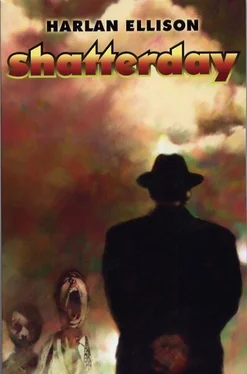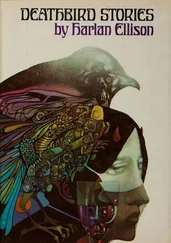What a jitney was doing that far off the regular transit routes, at that odd hour, was never explained. But the passengers—a man and his wife from Topeka, Kansas—had been killed instantly, and Alan had been rushed to the hospital.
Lying cocooned in spinex preservative, Alan had never regained consciousness, His body was broken and irreparable. His parents came and stared through the spinex, seeing the lusterless bruise their child had become.
“Mrs. Pryor… Mr. Pryor…”
They turned at the soft voice behind them.
“Doctor,” Alan’s mother pleaded, “save him… isn’t there something you can do…” Then she looked back and added, very softly, “He’s so small…”
The doctor was a large man. Had he been rigged out in heavy wool, with a lumberjack waldo attached to his right arm, he would have seemed quite right in a logging camp. He put one great, thick arm around the woman’s shoulders and said (in the gentlest voice for such a huge man), “I’m sorry. I’ve done all I can.”
Alan’s father began to cry. Tight, dusty little sobs that failed to stir the air.
“There is one thing…”
Alan’s father was beyond hearing him, but she turned—still under his touch—and looked into his face for an answer from faraway.
“The people from the training school. They registered a call for him. If he lives. If you’ll grant permission.”
She stood without speaking for a moment, then lay her hand on her husband’s chest. His head came up and he stared at her. “Dennis, please.” He had not heard, so she had to tell him. And when he heard, he started to shake his head, but she grabbed his coat and her voice was desperate. “Dennis, I’m going to do it… the only way. They can save him. They have the skill to do it. I will!”
So the collection men came and took Alan Pryor away in aircars with shutters that had been opaqued. They took him to the Island, where the paladins were trained, and they saved his life. They did things to his body the Pryors’ doctor never knew could be done. They saved Alan Pryor’s life, and they saved that bright yellow spark in his mind that was the mark of the sensitive.
Alan’s parents never saw him again. But they had known it would turn out that way when they signed the release. It was better that he should live, even as a paladin, even if they never saw him again.
Alan’s mother waited for their life to improve quickly after the school received their boy. But it never did.
A-32 in Bin 11.
T-28 in Bin 277.
Alan Pryor was a sensitive. He had a power we still do not understand. All we can do is thank God that we were given such kinds of powerful talents when we needed them. Surely they are the most lonely figures on our green Earth, and if they were not here to save us, the Earth would have been lost long ago. No nonsensitive has ever seen the face of the menace that continues to threaten us. Only paladins like Alan Pryor have seen it, and they have never told us what it is like. Yet it exists. No one who has ever seen a blasted area, or lost a loved one when that terrible wind blows, could doubt that these guardians of our world stand at the edge of horror every moment of their lives. The way Alan Pryor died should be proof enough. T o those whose love of anarchy blinds them to such realities, to those who cry out for investigation of the paladins and the Island, we offer the example of Alan Pryor. and swear he shall not have died in vain.
T-65 in Bin 288.
“This is a shock focus room,” the paladin said.
The children followed him with their eyes as he moved around the room, touching the eggshell white walls. It was a box. Empty of anything save four walls, ceiling and floor; eggshell white. No break, no stain, no aperture, no carpeting. The class had been brought in through one of the walls that had slid aside. And when they were inside, and seated on the floor, the wall had eased back, sealing them in. The paladin was very old. His skull was shaved clean and they could see where a metal plate had been laid to cover the right side. He had only one hand. He had served many years as a paladin and now—after all the battles—had been given a sinecure as teacher of the young.
There were eight of them, boys and girls, none older than ten, and they sat in a semicircle watching him, and listening. “This is where you’ll spend most of your time. It’s a training room.” He seemed very tired. “In this room we will try to make you sensitive. Do you know what that means?”
None of them knew what it meant.
The old paladin closed his eyes for a moment and the skin of his upper lip pulled down as he concentrated.
The walls began to shimmer and heat came from somewhere. Then there was the feel of a breeze, a stirring of warmth, an uncomfortable rush of air from another place. The wind rose. It climbed in intensity, hot, stifling, a sirocco. The children tried to sit in their places but the wind roared toward them, onto them, through them, past them, and they were slammed into the walls of the empty room. It was a wind from nowhere.
And then, behind the wind came the sounds. Sounds of things that were not metal or plastic or glass but neither were they human. Sounds of rising notes, of chitinous surfaces sandpapering against one another, of water being heated to steam, of tympani echoing from a mountaintop. The sounds seemed to pour from a single spot in the room. From a place high up in the middle of the air, where now the children could see a strange orange spiderweb of light spreading like a starburst of filament-fine lines, crazing in the trembling air as a projectile crazes glass.
“This is how it begins. When you hear these sounds and you see that orange light, you know it’s beginning. You will call it a spiracle; that is what we call it. And it means a hole is being made. Do you know what comes through that hole?”
The children could not answer. The wind had passed, but they lay in terror, tossed in a pile in a corner, and the sounds ratcheted and grated and scraped at their nerves, and they were frightened.
“This is what comes through the hole,” the old paladin said, closing his eyes again, concentrating again.
The orange spiderweb grew larger, split down the air, became a ten-foot rip in nothingness, and beyond it, as though seen through trembling water… darkness.
Things moved in the darkness.
The children scrambled together, arms and legs struggling to get farther away, closer to the white wall, out of sight and out of line of that fissure in the air, that color of orangeness that seemed to continue beyond the spectrum their eyes could perceive, those sounds that clattered in their bones and made their teeth hurt. And the things began to come through from the darkness.
The first one was squat and thick and the color of potatoes. It had no face but it had a ring of slit-eyes that ran round its forehead; the top of its mealy form—what might have been a head, had it not been so unlike a head—ended with a million trembling cilia, each suet-white and wormlike. It did not have legs, but it was divided up the middle and its substance compressed the two stubs like dough as it shambled forward.
The second was glass-smooth but dark. Light seemed to touch it and vanish, to be gathered in and nullified. It was faceted and part of it appeared and disappeared like reflections in mirrors when the surfaces were turned. It was large and thin and tall, then it was tiny and endwise and razored; then it was gone, then it was back.
And behind them came a thing that moved like a chicken, arching itself forward then hauling itself up behind and under. It was covered with matted fur like a rat that has soaked itself in oil. The tips of the hairs gave off a faint green light.
Читать дальше












